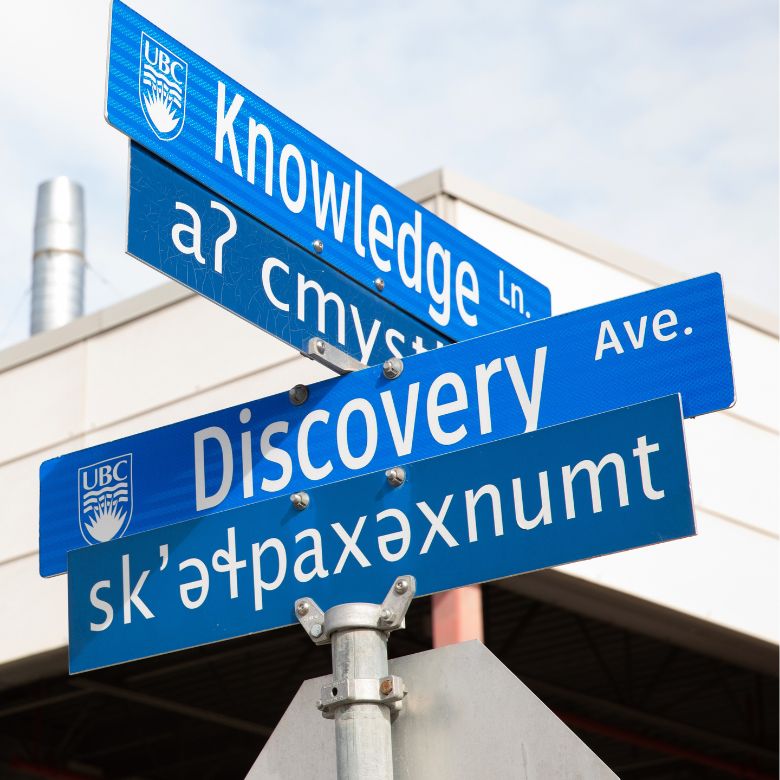Inquire
School of Social Work
Okanagan Campus
250.807.8738
ask.socialwork@ubc.ca


School of Social Work
Okanagan Campus
250.807.8738
ask.socialwork@ubc.ca
The Master of Social Work (MSW) degree program provides students with a wide knowledge base and advanced clinical skills for effective social work practice with individuals, families and communities. Our students graduate ready for professional leadership roles in clinical and direct-practice organizations.
We offer two program tracks: Advanced and Foundational.
The Advanced One-Year track is a full-time program of study requiring continuous enrolment. Students applying to the Advanced One-Year Track of the program must hold a Bachelor of Social Work degree, from an institution accredited by the Canadian Associate for Social Work Education (CASWE) or the Council of Social Work Education (CSWE) and wish to gain Masters designation while advancing their theoretical understanding and practice skills with individuals, families and groups.
The Advanced One-Year track requires the completion of 30 credits including one 6-credit practicum. See Admission Requirements for details. We do not admit students for part-time studies.
The Foundational Two-Year track is a full-time program of study requiring continuous enrolment. It is designed for those who hold a degree outside of social work and wish to develop a Master of Social Work designation while gaining theoretical understanding and practice skills with individuals, families and groups.
Students applying to the MSW Foundational Two-Year track will hold a bachelor’s degree with preference given to social science and behavioural science courses. The Two-Year track requires a completion of 60 credits including two 6-credit practica. See Admission Requirements for details. We do not admit students for part-time studies.
The MSW program incorporates critical theory into social work assessment and intervention. Students develop a deeper understanding of the integration of individual, relational, structural and global factors that promote resilience and strengthen capacity. We believe that to be effective social work practitioners, we have to understand the dynamic interaction between the biological, psychological, and social domains.
The MSW at UBC Okanagan is accredited by the Canadian Association of Social Work Education (CASWE). Our eight-year accreditation is effective from July 1, 2020 to June 30, 2028.
Join our next virtual MSW Info Session: Why the MSW Program on Tuesday, November 28 at 12 pm PST:
Or find out about other MSW Info Sessions.
Our faculty are passionate about teaching and the field of social work. Meet some of our faculty in the videos here and read more about them on our contact page.
Our focus is on a clinical social work program of study. The MSW curriculum consists of core courses, field education, and electives. In fact, field education is the cornerstone of our program.
Field education provides students with supervised opportunities to apply their course knowledge in a practice setting. We have strong and collaborative relationships with a wide range of agencies and organizations.
Students are assigned to community-based agencies and service providers for a set period of days with a focus on learning goals, ethical practice and social work competencies in the process of developing a professional identity. Students are required to complete 450 hours in a field education practicum per year of study.
We have multiple field education streams that drive our course sequencing including a distance practicum option. Visit our Field Education webpage to learn more about the available practicum streams.
For further information on Field Education please contact the Field Education Office at ask.field@ubc.ca
The MSW curriculum gives students the opportunity to complement a common foundational knowledge with courses of personal interest.
Students in our MSW program gain a wide knowledge-base of social work theories and their application to social work practice with individuals, families, groups, and communities. They learn to conduct clinical interviews and assessments, to use evidence to guide their practice, and to build meaningful therapeutic relationships with social work clients.
Browse all Social Work (SOCW) courses and descriptions.
The School of Social Work recognizes our responsibility to the social work profession to uphold standards of academic and professional excellence and to operate within the standards and policies of the University of British Columbia and the Canadian Association for Social Work Education (CASWE).
Applicants in this program are expected to have:
* Courses required for admission DO NOT need to be completed before applying to the MSW program. However, if conditionally accepted for admission, the student must submit an official transcript for the course(s) to the College of Graduate Studies by their deadline, which is normally at least two months prior to the start of the MSW program.
Applicants in this program are expected to have:
* Courses required for admission DO NOT need to be completed before applying to the MSW program. However, if conditionally accepted for admission, the student must submit an official transcript for the course(s) to the College of Graduate Studies by their deadline, which is normally at least two months prior to the start of the MSW program.
Grades and degree credentials required by UBC vary by country. Search the Required Grades and Credential Guide—a guide to assist students with non-Canadian academic degrees in estimating their eligibility.
A co-op work permit is required for the practicum portion of the social work program. Students will be provided details about this process upon acceptance to the program.
An international student advisor can answer questions about permits, immigration, medical insurance and the transition to UBC’s Okanagan campus in Kelowna, BC. Visit the International Programs and Services website to meet the team.
Visit our FAQ’s for additional tips for submitting your application and our MSW program.
Tuition fee instalments are applied to the student’s financial account in three equal instalments in Winter Term 1 (September), Winter term 2 (January), and Summer Terms 1-2 (May) of each year. For further details refer to the UBC Okanagan Academic Calendar for full admission and program requirements information. Please note, the MSW Program is a specialized program for tuition fees.
Annual Student Accident Insurance
In August of every year, admitted and continuing students must purchase UBC student accident insurance for the upcoming academic year. The student accident insurance coverage is required for many field education practicums. Failure to comply with the School of Social Work’s Student Accident Insurance policy may result in involuntary withdrawal from the program. Students will not be assigned to a field practicum without this insurance. The current cost of this is $7 CAD/annually (subject to increase).
Information and instructions for purchasing UBC student accident insurance, include the deadline to complete this task, are announced on the MSW Program Homepage on Canvas in early August. The payment form will be updated annually in August.
Explore these scholarship and award opportunities for social work students.
The College of Graduate Studies administers merit-based graduate awards with many award competitions each year. Rules and regulations regarding these internal scholarships and fellowship are enforced by the College of Graduate Studies as is the administration of payment.
*We are a professional graduate program that is course-based, not thesis-based. Most scholarship opportunities are not available to MSW students; only a student that is pursuing the MSW Thesis-Option may qualify for a merit-based opportunities. Those MSW students seeking funding may wish to search if external opportunities for an award (donor/sponsored funds) or bursary (financial needs-based) exist within their place of employment, community or through private companies.
The family and friends of the late Jody Rud, MSW, have endowed an award for a student in UBC Okanagan’s Master of Social Work program. Consideration is given to students who demonstrate a combination of academic achievement, volunteerism, community involvement, and/or campus leadership. Jody is remembered for his compassionate nature and his dedication to making a difference in the lives of others.
The annual deadline for this award at the end of Winter Term 2 – a notification will be sent out to MSW students from the program. Students may contact The School of Social Work or ask.socialwork@ubc.ca for more information.
The Matthew Yip Memorial Award for Outstanding Field Training in Social Work A $2,200 award has been endowed by family, friends, and colleagues in memory of Matthew Yip, BASc ‘15.
The award is offered to an outstanding graduate student in the Masters of Social Work program in the School of Social Work in the Faculty of Health and Social Development at the University of British Columbia, Okanagan campus whose combination of academic achievements and excellence in a field placement focused on mental health cases. Preference is given to students whose specialty is focused on depression, anxiety, and suicide cases for groups and individuals.
Graduate awards may also be available from foundations, private organizations or foreign governments (check with your country’s education authority). Students are expected to apply for relevant scholarships and fellowships if they are eligible, and to actively pursue financial opportunities at their discretion. Check Scholarships Canada for more information.
*We are a professional graduate program that is course-based, not thesis-based. Most scholarship opportunities are not available to MSW students; only a student that is pursuing the MSW Thesis-Option may qualify for a merit-based opportunities. Those MSW students seeking funding may wish to search if external opportunities for an award (donor/sponsored funds) or bursary (financial needs-based) exist within their place of employment, community or through private companies.
The School of Social Work wants to help you create a strong application to the MSW program.
Prospective students are strongly encouraged to review the School of Social Work’s FAQs section, as well as the College of Graduate Studies’ Prospective Students page, before beginning the application process.
Note: Criminal Record Checks are to be completed immediately after the applicant accepts an offer of admission.
A strong undergraduate grade performance is included in the application review process.
A complete application package must include:
The MSW application opens one year before the intake year on September 1st. Applying takes time. We recommend you start your application at least two months in advance of the published deadlines as we do not accept late applications to the MSW program. Only completed application packages are forwarded to the School of Social Work for admissions decisions.
The applicant is responsible for ensuring that all required documents, including letters of reference, are submitted well before deadline. It is also the student’s responsibility to frequently check the status of their online application.*
* If you submitted an online application, please login to the online application system through which you applied to check your application status. Please note, you may check your application status at any time by logging in to your online application account and viewing your application checklist. Please allow up to 10 business days after the receipt of documents for verification and processing by the College of Graduate Studies. Documents that do not follow our requirements may require additional processing time.
Applications are due by:
|
|
||
| Domestic applicants | |||
| September | January 10 | ||
| International applicants | |||
| September | January 10 |
The University of British Columbia is a global centre for research and teaching, consistently ranked among the 40 best universities in the world. In the Masters of Social Work program at UBC’s Okanagan campus, you gain all the benefits of attending a globally respected university while studying in a close-knit learning community.

UBC’s Okanagan campus borders the dynamic city of Kelowna, a hub of economic development with a population of about 150,000 people—the fourth fastest growing population in Canada. In fact, the Okanagan Valley is rated one of the best communities in Canada to grow your business.
More than 160 buses travel daily from campus to key locations such as Kelowna’s cultural district and thriving downtown waterfront. The campus is two minutes from the Kelowna International Airport, one of the top 10 busiest airports in Canada.
UBC Okanagan is situated within the First Nations territory of the Okanagan Nation, whose spirit of stewardship for the land is reflected in the university’s respect for sustainability.
A diverse natural region with sandy beaches, beautiful farms, vineyards and orchards, and snow-capped mountains, the Okanagan Valley features sweeping stretches of lakeside and endless mountain trails for biking and hiking.
Check out this 360-degree video: Kelowna From Above.*
* Best viewed using desktop Chrome or Firefox (desktop) or YouTube app (mobile).
Full-time UBC Okanagan students can live in residence, which offers modern living with easy access to academic and personal support. Residences are surrounded by hiking and biking trails, plus panoramic views of the campus and valley.
* UBC does not verify or endorse information shared on this third-party website, which is offered here as a public resource only.
Follow us: Follow the School of Social Work on Facebook to stay connected, get involved in advocacy, and to gain better access to career resources.
Stay active: Take advantage of the many opportunities to get involved and play—from workout space in the new Hangar Fitness and Wellness Centre and our 1,561 square-metre gymnasium, to athletic courts, intramurals, fitness classes and nationally ranked varsity athletics. Have a ball in Sports and Recreation.
Relax: The Graduate Collegium is a gathering place where grad students can hang out, eat lunch, spend time with their fellow students, and attend or host special events. The lounge-style room is open seven days and week and is outfitted with comfortable furniture, kitchen facilities, and individual and group-work spaces.
College of Graduate Studies: Your hub for administrative support and such things as graduate workshops for professional development and for assisting you from the admissions process through to your graduation.
Centre for Scholarly Communication: Supports graduate students, post-doctoral fellows, staff, and faculty in disseminating their research. The Library’s CSC provides one-on-one consultations and workshops, including writing support for theses, dissertations, journal articles, and grant proposals.
Centre for Teaching and Learning: Provides support related to teaching, TA training, and use of technology in educational programming.
Learn more about graduate student resources and support.
Few occupations can match social work, which offers countless interesting workplaces and a wide variety of occupations. Social workers are educators, therapists, leaders, managers, and researchers. Opportunities with an MSW degree from UBC Okanagan campus range from but are not limited to private enterprise, health care and government. Graduates often enter jobs in mental health, substance-abuse rehabilitation, child and adult protective services, hospitals and clinics, programs for the aging, and community service organizations.
Students are encouraged to explore opportunities and resources for networking, job postings, professional development and guidance. The following Canadian Social Work organizations offer support for the profession and for advancing social justice:
Prepare to hit the ground running with resources and services provided by the Advising & Involvement Centre. Tell your story with resumé and cover-letter strategies, and search Work Study jobs for experience relevant to your degree and career goals.
alumni UBC is a member-driven association that offers a variety of lifetime programming and communications to enrich the lives of UBC graduates. The ‘Your Next Step’ program offers webinars, speaker series and professional development sessions. It is designed to provide advice, tips and resources in areas of career development to graduates for life after university. Realize the promise of a global community with shared ambition for a better world and an exceptional UBC.